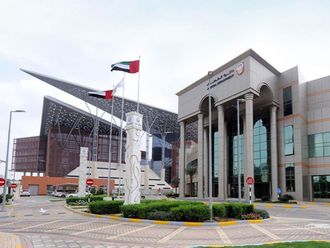Abu Dhabi: The state security division of the Federal Supreme Court on Sunday heard four prosecution witnesses in the hearing of 15 men accused of membership of Al Qaida’s affiliates of Al Nusrah Front in Syria and another militant Syrian opposition group, Ahrar Al Sham, and of collecting funds for these.
The witnesses told the court, presided over by Justice Mohammad Al Jarrah Al Tunaiji, they conducted searches of houses and cars of the defendants, warranted by the prosecution.
They said they gained evidence including laptops, cellphones, CDs, USPs containing files and images on how to build explosives, minutes of meetings and correspondence.
The defence countered that, saying the evidence gained during the searches might belong to cohabitants and not to the defendants.
But the witnessses confirmed evidence gained belonged to the accused, who signed reports to this effect.
The court decided to adjourn the hearing until September 30, when a fifth prosecution witness will be interviewed.
The judge also turned down bail requests from the defence lawyers.
Lawyers demanded last week that three Emiratis and a Comoros citizen, charged with trying to build explosives and joining Al Qaida-linked groups, be released on bail on grounds that they will not run away and for health and education reasons.
The lawyers told the state security division of the Federal Supreme Court on Tuesday the men should be acquitted for lack of evidence.
The men are among a total of 15 accused of membership of Al Qaida’s affiliates of Al Nusrah Front in Syria and another militant Syrian opposition group, Ahrar Al Sham, and of collecting funds for these. The total number of defendants on trial at the Federal Supreme Court are nine Emiratis, four from the Comoros islands off east Africa and two Syrians.
Four other Emiratis are being tried in absentia.
All 11 who appeared in court denied the charges. A defence lawyer asked for four witnesses to be called to give evidence.
The explosive device alleged to have been assembled by the accused had leaked toxic chemical fumes that affected the environment, according to the court documents.
The prosecutors said the accused had travelled to Syria to make contact with armed groups, and had collected money, devices and equipment for use in attacks on civilians in Syria.
The men were also charged with recruiting members and raising money for the two terrorist groups as well as making explosives and possessing firearms without licences, said prosecutor Saqr Saif, who read out the indictment.
They were accused of establishing a website and a Facebook page to publish the terrorist thoughts of Al Qaida.
According to a new counter-terrorism law endorsed last month, convicted terrorists face capital punishment, life imprisonment and fines of up to Dh100 million.
According to prosecutors, the defendants are also being tried under the UAE’s cybercrime law, which stipulates a jail term of not less than five years and a Dh1 million fine for anyone creating or running an electronic site to publish information online or through any information technology means to promote any terrorist groups. They are also tried under environment protection laws.












